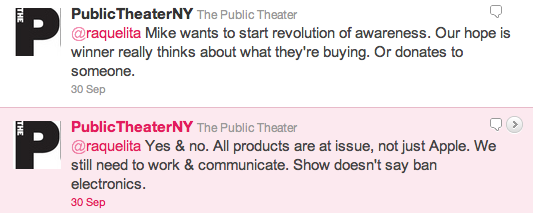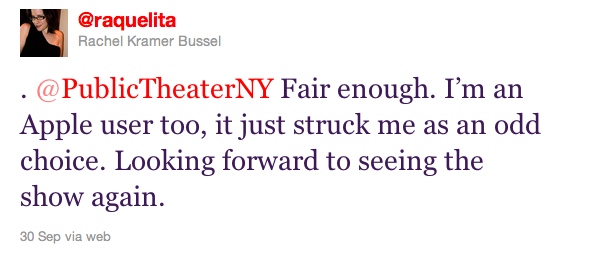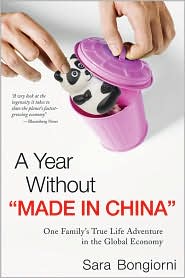Some thoughts on seeing The Agony and the Ecstasy of Steve Jobs for the second time
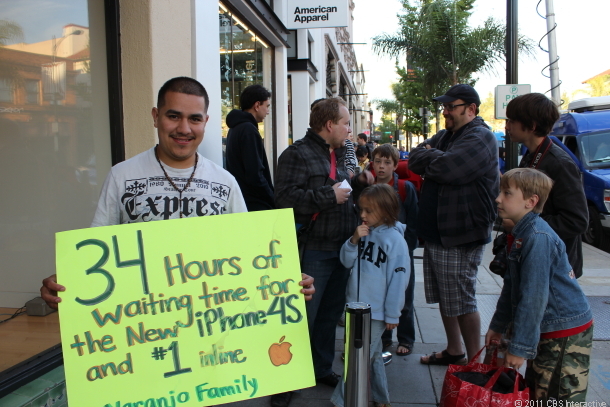
photo by Robert Cheng/CNET
I saw this sign posted in a CNET News live blog about the new iPhone, and I couldn't help but think that 34 hours is the same amount of hours a worker at Foxconn worked in a row before dying, as discussed by Mike Daisey, who was in China while this occurred, in The Agony and The Exstasy of Steve Jobs, which I saw on Thursday at The Public Theater. And I think that's exactly the connection is meant to be making in the wake of seeing the show. First let me say that I'm in now way a theater critic and am just sharing my own highly subjective thoughts on seeing the piece on two random nights in two different cities, Berkeley, and New York, and, in what I believe are two slightly different climates.
The connection to me seems especially apt because one of the sub-themes of the show, next to Steve Jobs' career ascent and Apple's rise and fall and rise, and the working conditions as Foxconn, is the culture of fandom Apple created, as evidenced by Daisey's personal story and, if anyone's been reading any of the gushing tributes to Jobs, many, many fans. It's hard to look at the 14-year-old girl in my People magazine and not think of the 14-year-olds described in the show.
I barely knew a thing about Steve Jobs' life and am not all that interested; the most irksome aspect of the coverage I've seen is the disgusting, outdated use of "illegitimate child" by mainstream media to describe his daughter Lisa Brennan-Jobs, as if we are not living in 2011, which solidified for me the extremely central place heterosexual marriage continues to have in determining who is worthwhile, and who isn't.
I'm also not one of the aforementioned Apple fans; I use Apple products, namely my MacBook Pro, which I purchased in January in Emeryville one day after seeing the show, so that I could use Skype, and my iPhone, but I would certainly call myself more an Apple user than an Apple fan. I was curious to see the show again both to see how it had changed and to perhaps instill in myself some sense of what I can do in terms of this issue. We bought our tickets several weeks ago, so before Steve Jobs died, and that certainly added a different twist to the show. I would also recommend attending with someone who's been to China and Shenzhen, as I did, just for a little extra detail, not necessarily related to the labor issue.
So there were two major things I noted that were different, and again, these may or may not be what anyone else took away as the salient points, but they struck me. I don't have the world's best memory so the things that stand out for me after a performance are usually either overall impressions or precise lines, and two that I remember from the first performance were Daisey asking, "Do you really think they don't know?" (or perhaps it was "Apple doesn't know," but that is indeed the "they" he is talking about). To my recollection, in January it was delivered not so much as a question but rather an extremely angry taunt to the audience, after we'd just heard about some of the horrors of the working conditions. If anything it was almost rhetorical, as if anyone who could legitimately answer "No, I don't think they know" were simply ignoring the obvious. This time, the question was asked more softly, but no less genuinely. It turned the query back onto the audience, prompting us to genuinely consider whether a company so careful about every other detail could have overlooked things like its own supplier responsibility reports. The question took on added weight now, with even more press in the subsequent nine months about these working conditions. Both deliveries were effective, but I think the quieter tone, one similar to the one used in the new ending I saw, about Jobs' death, is more eerie, more haunting. It's perhaps more weary, but it is a question I think is at the heart of the show and this issue, with the next unasked question being if Apple does know, what, if anything, they plan to do about it, whether they plan to think differently than their business peers who've also set up shop in China (or Brazil, or wherever, though the show is focused on China), or not.
Speaking of which, another target of the show that obviously didn't exist in January was Wired's Joel Johnson March 2011 cover story on Foxconn, which, while noting the suicides, generally summed up the issue by saying that it sucks to work at a factory, but this factory not so much more than any other (my summary). I vaguely recall the tech press coming in for a bit more scrutiny in January, but I can't say that for sure.
The other line that I recall extremely clearly from Berkeley was Daisey telling us that if he shared everything he heard in Shenzhen, we would close our ears. That too was delivered with ire, almost as if he were upset about suppressing whatever he was holding back, and I think that statement is something that can apply to almost any injustice being spoken about. There is a limit to our being able to take in this kind of information, and I don't think that is all down to greed or indifference. I think there are many reasons we, and I'm speaking beyond a theatrical audience but to we as humans, would close our eyes and ears. I don't say that to absolve myself from all that I'm not doing, but simply to say that there is a point where we all have to choose to focus on either a single set of issues or one particular issue or our immediate lives to the exclusion of even issues we care about.
But still that line stayed with me, and the question of whether Steve Jobs "closed his ears," whether he either didn't know, or knew some things, or knew and didn't do anything about it, or some other option that hasn't been publicly revealed yet, is a question, though perhaps the more relevant question is what Apple and other electronics companies will now do. One criticism I've seen repeatedly is that Apple is not the only huge corporation in China utilizing workers under such conditions and that people are lining up for and eager for these jobs. Both of those statements may be true but I don't think that even if they are they negate the issues of people dying of overwork or committing public suicides or being unable to claim their overtime. The show is an exploration of how these products are made, literally, in factories, as well as how they are dreamt up, at some of the vision behind their creation, and connects the two, and asks its audience to connect the two as well.
Regarding the "they'd close their ears," I wrote the above and then checked my post on that show to find that what I remember hearing is actually "you'd close your fucking ears" and I think my summary then is an apt summary for my thoughts know, except that I obviously did want to know more than I didn't want to, because I've been reading and following the story since then. I don't have much to say beyond that, but I do highly recommend seeing it, Apple fan or not (but especially for the Apple fans).
Coming on the heels of a story about a worker whose hand was fused together building an iPad, yeah, that's pretty chilling. It made me want to know and, I will fully admit, not want to know. I'm still pretty awed by the fact that there were no photos shown, nothing but words, but the images I was left with were frightening and sad and again, that dichotomy, that reality that even the LED screens lighting up the stage were likely made in the places being talked about.
Labels: apple, Foxconn, Steve Jobs, The Agony and the Ecstasy of Steve Jobs, theater













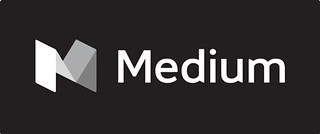









 The Big Book of Submission: 69 Kinky Tales
The Big Book of Submission: 69 Kinky Tales




 Flying High: Sexy Stories from the Mile High Club
Flying High: Sexy Stories from the Mile High Club














